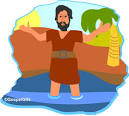John 10:32 – Jesus answered them, "I have shown you many good works from the Father; for which of them are going to stone me?"

In our prior post, the Jews asked Jesus to tell them plainly whether he was the Messiah or not. As Jesus points out the facts (particularly that He and the Father are one), the Jews became enraged and picked up stones with the intent of killing him.
In response, Jesus asks which of his good works prompted them to try and kill him. Once again, we find that Jesus asked a question which was designed to get the listeners to stop and think. He wants them to gain control of their emotions and use their brains to reach a correct verdict. Jesus often refers to this as judging justly or righteously (John 7:24).
Oddly enough, the Greek word translated 'good' in this verse does not have an exact equivalent English word. Its meaning contains facets of things like goodness and usefulness while also implying things that are distinguished, profitable or of moral excellence. It refers more to the quality of the work that was done rather than the actual work itself.
The meaning is this: Jesus did many works such as healing, feeding the multitudes, casting out demons, showing the love of the Father, teaching/revealing the gospel, etc. Each one of these beneficial works was done in a manner that was excellent, profitable, useful and good for everyone involved (and for the nation as a whole).
This gives us reason to pause – only our loving, sovereign God is capable of fulfilling his purposes so completely and perfectly! And here is more good news: He will do the same thing for us. He will use every circumstance of our lives to bring us to spiritual maturity and guarantee our eternal good (Romans 8:28)!
 If the angry, emotional Jews would have paused to consider this question, they would have realized that the very quality of the works Jesus did testified/proved that they were manifestations of the goodness of God. If God was working through Jesus to bless mankind in this way, then Jesus must have been sent to them from God.
If the angry, emotional Jews would have paused to consider this question, they would have realized that the very quality of the works Jesus did testified/proved that they were manifestations of the goodness of God. If God was working through Jesus to bless mankind in this way, then Jesus must have been sent to them from God. Sadly, they are busy picking up stones to kill Jesus as a blasphemer, despite the fact that he has gone around doing nothing but good (Mark 7:37)!
As believers, do we ever allow ourselves to be ruled by emotion? How did that turn out? Many times emotion causes us to make bad choices. For instance, those who give free reign to their anger are capable of killing someone in the heat of the moment. Those who give free reign to lust are capable of having an affair and ruining their marriage.
Christians should never allow their emotions to rule them. Instead, the scriptures encourage each believer to cultivate self-control, which is a fruit of the Spirit:
Galatians 5:22-23 - But the fruit of the Spirit is love, joy, peace, long-suffering, gentleness, goodness, faith, meekness, self-control: against such there is no law.
Here is something to think about: Satan loves it when we destroy our own lives – it makes less work for him! Instead of helping him out by letting our emotions run wild, let's ask Holy Spirit to help us build up our level of self-control.
John 10:33 – The Jews answered him, "It is not for a good work that we are going to stone you but for blasphemy, because you, being a man, make yourself God."
There are two types of blasphemy. One is when God is deprived of the honor and glory that is due to him. The other is when his glory/majesty is offended or insulted because something unsuitable is ascribed to him.
The Jews argue that they are not stoning Jesus for any of his good works. They allege he is a blasphemer because he is a mortal man who lays claim to divine honor (John 10:30). This would be a correct definition of blasphemy if it were true. But it isn't. If the Jews had any kind of spiritual awareness (eyes to see or ears to hear), they would have recognized the divinity of Jesus, because it was conspicuous in the 'goodness' of the works he performed.
 The unbelieving Jews also rejected the actual works themselves. For instance: the works of Jesus included the healing of a lame man (John 5: 1-46), a blind man (John 9:1-7) and a man with a withered hand (Luke 6:6-10). These were clearly miracles, yet the Jews rejected them and charged Jesus with blasphemy for supposedly violating the Sabbath.
The unbelieving Jews also rejected the actual works themselves. For instance: the works of Jesus included the healing of a lame man (John 5: 1-46), a blind man (John 9:1-7) and a man with a withered hand (Luke 6:6-10). These were clearly miracles, yet the Jews rejected them and charged Jesus with blasphemy for supposedly violating the Sabbath.This confirms that evil is hiding in the hearts of these Pharisees. They claim to be good shepherds of the people, yet they are willing to reject/deny obvious miracles rather than acknowledge Jesus as Messiah.
In reality, they were acting out of their own selfish desires. Jesus and his gospel threatened to take away the things they loved the most - the praise of men, the authority they exercised over the people and the monetary gain they received from their positions.
John 10:34 – Jesus answered them, "Is it not written in your Law, 'I said you are gods?'"
The Jews are using the law as the basis for condemning Jesus of blasphemy and punishing him with stoning (Leviticus 24:16). Jesus will now use the law to defend himself of these false charges. In this case, Jesus uses the term 'law' to mean the entire Old Testament. He is quoting from the divinely inspired book of Psalms:
Psalm 82:6 - I have said, You are gods; and all of you are children of the most High.
In the Old Testament, magistrates (rulers) and judges were given the title of 'gods'. For example, in Exodus 7:1, Father God describes Moses as a god:
Exodus 7:1 - And the LORD said unto Moses, See, I have made you a god to Pharaoh: and Aaron your brother shall be your prophet.
Father God does the same thing in Exodus chapter 4:
Exodus 4:16 - And he [Aaron] shall be your [Moses'] spokesman unto the people: and he shall be, even he [Aaron] shall be to you [Moses] instead of a mouth, and you shall be to him instead of God.
In these scriptures, God is saying that magistrates/rulers/judges are a type of god because He himself has commissioned them; they derive their authority (and the authority of their office/position) directly from him.
This had special significance for the Jews because they were God's special people. Those whom God called to govern his people were also filled with his Spirit in order to rule and judge them as God expected.
Let's look at a few examples:
- When Moses chose the seventy elders to assist him in ruling the Israelites, God put his spirit upon them. The people knew this because the 70 prophesied after the Spirit came upon them (Numbers 11:25-26).
- When God called Joshua to lead Israel after the death of Moses, he filled him with his Spirit (Numbers 27:18).
- God also anointed King Saul with his spirit immediately after calling him to his office and all the people knew he prophesied (I Samuel 10:9-11).
- The priests derived their authority to rule/judge from God (Deuteronomy 17:8-9). God actually pronounced judgment through them with the Urim and Thummim (Numbers 27:21).
- The judges of Israel also received their authority from God. They were cautioned to be careful to listen to the Lord, who was with them in judgment (II Chronicles 19:6).
So the point is that many, many mortal men who were called and empowered/anointed by God to rule or judge his people were often given the title 'god' because of the positions they occupied.
The Jews of Jesus' day were well acquainted with this concept, and they accepted it without question. In fact, much of the authority they now exercised over the Jews was due to this very principle, although they no longer used the actual title of 'god'.
Using this as a starting point, Jesus will now make a legal argument for his innocence.
John 10:35-36 – "If he called them gods to whom the word of God came – and Scripture cannot be broken - do you say of him whom the Father consecrated and sent into the world, 'you are blaspheming,' because I said, 'I am the Son of God?'"
If the term 'gods' can be applied to those whom God has anointed with his Spirit and given authority to judge/govern his people, then how can the Jews possibly accuse Jesus of blasphemy for applying it to himself?
After all, God had commissioned Jesus in the role of Messiah/Redeemer; Jesus was sanctified and sent into the world to bring us salvation from God. Not only that, he has also been appointed judge of the world:
John 5:22 - For the Father judges no man, but has committed all judgment unto the Son:
John 5:27 - And has given him [Jesus] authority to execute judgment also, because he is the Son of man.
This is an example of Jesus arguing his case on a technical interpretation of the scriptures which was a customary practice in the Jewish Rabbinic schools. It was a tool that the Pharisees themselves often used.
Jesus' defense might have sounded something like this:
 The law applied the term 'gods' to men who held offices of authority and represented God in matters of judgment. Keeping in mind that no portion of scripture could be wrong, how much more could the term 'God' or 'Son of God' be applied to Jesus since he was commissioned by God to hold the office of Redeemer/Messiah and he is the eventual judge of the world?
The law applied the term 'gods' to men who held offices of authority and represented God in matters of judgment. Keeping in mind that no portion of scripture could be wrong, how much more could the term 'God' or 'Son of God' be applied to Jesus since he was commissioned by God to hold the office of Redeemer/Messiah and he is the eventual judge of the world?This tells us two things.
The Father has greatly honored his Son. Rulers/judges were called gods even though they had only a measure of the Spirit of God and their authority only extended over a particular city or nation.
By contrast Jesus had the Spirit without measure (John 3:34). His commission extends throughout the entire earth (John 3:17); he is Lord of all. God sanctified Jesus - he was set apart for a holy purpose; uniquely qualified and equipped for the Messianic office. This was more than sufficient reason for him to be called the Son of God (Luke 1:35).
The Jews greatly dishonored the Son of God. How much more dishonor could the Jews show to Jesus? They reject every truth he gives them, they reproach and challenge him at every turn as they obstinately continue in unbelief. They refuse to give Jesus the respect that they would easily give to any human judge or ruler.
John 10:37-38 – "If I am not doing the works of my Father, then do not believe me; but if I do them, even though you do not believe me, believe the works, that you may know and understand that the Father is in me and I am in the Father."
I don't know about you, but if I were Jesus I probably would have given up on the Pharisees by now! I would have written them off as hopeless or called down fire from heaven to consume them! But God never gives up on anyone. Instead of giving them what they deserve, Jesus once again reaches out to them. If they won't accept him by faith, perhaps they will listen to reason.
Logically speaking, the case is actually pretty straightforward. Whether or not Jesus is a blasphemer depends on whether or not he represents God. Jesus offers his miracles as a strong confirmation that he HAS been sent by God and that he DOES represent the Father.
He then makes an offer to the Jews – if his works are not divine, then go ahead and reject his messianic claims. After all, God does not require blind faith; he gives ample evidence of his existence (Romans 1:20).
But if Jesus performs miraculous works which can only be done with divine power (such as feeding five thousand people with just a few loaves and two fish or restoring sight to a man born blind), then the works themselves testify that his nature is divine. In other words, the works themselves confirm that he is the Son of God.
In fact, once Jesus returned to heaven it was the miracles wrought by his disciples, in his name and by his power, which continued to confirm his doctrine (Acts 4:10).
This also proves that he is one in essence with his Father: Jesus and Father God are one. Therefore, the only logical conclusion is that Jesus is NOT committing blasphemy when he declares himself to be the Son of God.
John 10:39 – Again they sought to arrest him, but he escaped from their hands.
Jesus has clearly refuted the charges of blasphemy. It would have been great if his words had caused the hearts of the Pharisees to melt with repentance, but that was not the case. They chose to further harden their hearts.
 Now, instead of just dealing with anger, they are under the influence of pride and resentment as well – they have been publicly corrected by Jesus and everyone heard it! They no longer have any basis to stone him, so instead they attempted to arrest him and try to prosecute him as an offender against the state.
Now, instead of just dealing with anger, they are under the influence of pride and resentment as well – they have been publicly corrected by Jesus and everyone heard it! They no longer have any basis to stone him, so instead they attempted to arrest him and try to prosecute him as an offender against the state.But their evil plans fail when Jesus escapes from them. When the day came for him to lay down his life, he would voluntarily place himself into their hands, but this was not the day - Jesus had more work left to do.
John 10:40 – He went away again across the Jordan to the place where John had been baptizing at first, and there he remained.
Jesus left the city of Jerusalem for the more remote countryside. Scholars see two significant things in this action.
One, evil people can drive Christ and his gospel from their city, but they cannot banish either one from the world. No matter how hard the fight, evil is already a defeated foe. Our heavenly Father laughs at their attempts to overthrow his kingdom:
Psalm 2:2, 4 - The kings of the earth set themselves, and the rulers take counsel together, against the LORD, and against his anointed. He that sits in the heavens shall laugh: the Lord shall have them in derision.
Two, Christ's travel beyond the Jordan was a foreshadowing of taking the kingdom of God from the Jews and bringing it to the Gentiles (Romans 11).
The particular area where Jesus chose to go was the same place that John the Baptist had ministered. John had prepared the way for Christ by sowing many seeds of repentance in this region (John 1:28). These souls were now ready to be harvested for the kingdom of heaven.
John 10:41 – And many came to him. And they said, "John did no sign but everything that John said about this man was true."
The people in this region were the spiritual opposite of the Jews in Jerusalem. They were hungry for the gospel message. Their hearts and minds were convinced that Jesus was the long awaited Messiah; their faith was stirred up and they found numerous confirmations that Jesus had come to them directly from the Father.
They recalled what they had seen and heard from John the Baptist and they compared it to the life/ministry of Jesus. Here is what they concluded:
Jesus was greater than John the Baptist, so he must be the Christ. John the Baptist never performed a single miracle, while Jesus performed numerous miracles. Therefore, these people concluded that Jesus had a power far superior to John; he must be greater than John. If John was a holy prophet, it would make sense that Jesus was the Messiah.
It is interesting to note that people have often wondered why John the Baptist did not perform any miracles. Perhaps this is the reason – God did not want to confuse the people of that day. It was important for them to recognize that Jesus was superior to John, so that they would follow Jesus.
 Christ exactly answered John's testimony of him. John did everything in his power to point people to Christ. He encouraged his disciples to follow Jesus. He publicly declared Jesus to be the Lamb of God. He identified Jesus as the one who baptizes with Holy Spirit and fire. He declared that Jesus was so much greater than himself; he was not worthy to untie his shoe. The Jews in this region remembered the testimony of John and believed all these things about Christ.
Christ exactly answered John's testimony of him. John did everything in his power to point people to Christ. He encouraged his disciples to follow Jesus. He publicly declared Jesus to be the Lamb of God. He identified Jesus as the one who baptizes with Holy Spirit and fire. He declared that Jesus was so much greater than himself; he was not worthy to untie his shoe. The Jews in this region remembered the testimony of John and believed all these things about Christ.John was dead and gone, but the seeds he planted stayed with the people, until such time as Holy Spirit caused them to grow and sprout into eternal life.
John 10:42 - And many believed in him there.
The testimony of John the Baptist along with the doctrine and miracles of Jesus were enough to produce life-changing faith in the lives of these people. In fact, the number who believed and became disciples of Christ were many.
Let me offer you some encouragement:
Let me ask you this: Have you ever shared the gospel message, but felt like it did not accomplish anything, or that it fell on deaf ears? If so, take heart. The gospel of repentance that John the Baptist shared with people didn't bring immediate results in every case either. But those seeds stayed in the heart of the people. Long after the death of John, they sprouted and grew to eternal life.
I encourage you not to become weary in sharing the salvation message. You never know when those seeds will sprout and bring someone from this generation into the kingdom of heaven.
Let me offer you some relief:
In today's post we talked about God not giving up on the unbelieving Jews. Even though they deserved death, God shows them mercy by patiently reaching out to them again and again.
I don't know about you, but I am very, very relieved that Jesus doesn't give me what I deserve! It is a good thing to examine your own faults from time to time. It makes you grateful for the mercy of God, it humbles you, and it helps you overlook the faults of others.
Let me offer you some strength:
This chapter in John's gospel testifies to the many miraculous acts of Jesus. Here is a truth that will strengthen your faith: Jesus is still in the miracle business! His power hasn't diminished in any way and neither has his love for you.
So if you need a miracle in your life, no matter what it may be, stand strong in the promises of God! Stir up your faith, meditate on the word and ask God for what you need. Remember, nothing is impossible with God!
